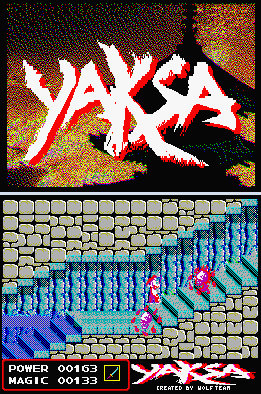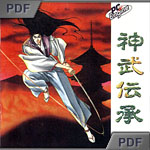|

|

|
|
神武伝承
1989 © Big club
© Wolf team
Release : 1989-06-28 (¥6700)
HuCard (4 Mbits) BG01003
Shooter / 3D
|
Jinmu Denshō (also known as Jinmu Denshō Yaksa)
is an action game by Wolf Team. The action
takes place during the Sengoku Jidai era, period of chaos and civil war
in Japan. A god demon is threatening to overcome the world and
Lori, a lone samurai, embarks on a treacherous journey through monster filled
lands. Jinmu Denshō heavily borrows from Sega's classic
Space Harrier and the action is seen from behind's Lori as he
runs into the screen. However, here, the player is also allowed to stop and
even run backwards, giving him a chance to avoid enemy fire or to collect
items he may have missed (although this option is not available in all stages).
Additionally, although Lori has to obey the laws of gravity and stay on
the ground, he comes with the ability to jump (or hi-jump) and to climb on floating
platforms in order to reach special items and enemies. He also comes equipped
with a very limited short-range sword but statues scattered around each stage
release projectile weapons, such as shurikens or balls of energy -
alas, these upgrades slowly disappear as Lori receives damage.
Jinmu Denshō is single-player only and consists of seven
stages (a passwords systems allows the player to save his progress).
|
 Jinmu Denshō is actually loosely based on Yaksa, a Japanese action
RPG/Strategy game released by Wolf Team for the NEC PC-8801,
NEC PC-9801, Fujitsu FM77 and MSX 2 (picture on the left) in 1987
- this probably explains why Jinmu Denshō is often referenced as Jinmu Denshō Yaksa.
It is worth
mentioning that Wolf Team apparently originally started as a development
team at Telenet Japan, and they contributed work on the first Final Zone
and, most importantly, the first Mugen Senshi Valis (aka
Valis The Fantasm Soldier) game. Wolf Team became independent in
1987 and Yaksa was the first game under their new brand name. However,
instead of porting Yaksa to the PC Engine (or at least porting
the side-scrolling action scenes which bear a fair resemblance with the ones
found in Valis), Wolf Team went a whole different route and
created instead a 3D shooter set
in a similar world and universe and starring Lori, one of the playable
characters from the original PC game.
Jinmu Denshō is actually loosely based on Yaksa, a Japanese action
RPG/Strategy game released by Wolf Team for the NEC PC-8801,
NEC PC-9801, Fujitsu FM77 and MSX 2 (picture on the left) in 1987
- this probably explains why Jinmu Denshō is often referenced as Jinmu Denshō Yaksa.
It is worth
mentioning that Wolf Team apparently originally started as a development
team at Telenet Japan, and they contributed work on the first Final Zone
and, most importantly, the first Mugen Senshi Valis (aka
Valis The Fantasm Soldier) game. Wolf Team became independent in
1987 and Yaksa was the first game under their new brand name. However,
instead of porting Yaksa to the PC Engine (or at least porting
the side-scrolling action scenes which bear a fair resemblance with the ones
found in Valis), Wolf Team went a whole different route and
created instead a 3D shooter set
in a similar world and universe and starring Lori, one of the playable
characters from the original PC game.
|
Game Staff (Copied from the end credits) :
|
-STAFF-
Program
F. Fukaya
T. Kawaguchi
|
|
Music
M. Uno
Goblin Sound
Benjamin. Hebi
|
|
Graphic
K. Nakajima
A. Sekine
Original Writer
M. Akishino
|
|
Producer
Eiko. Iida
|
|
O
M
A
K
E
|
|


|
|
|
Click on picture to enlarge |
S
E
C
R
E
T
S
|
|
Level Passwords:
Level 1 : CGUEA-UQQBBW
Level 2 : BKUEA-SYRAA4
Level 3 : 5OUEA-XASFBU
Level 4 : USUEA-XTQDB2
Level 5 : 1WUEA-WVZGBU
Level 6 : X0UEA-YSWBAK
Level 6 (Best weapon): AKISH-INOSAN
Level 7 : 14UEA-UTRDAM
Level 1 (2nd loop): KG2EA-AHVGAS
Level 2 (2nd loop): GK2EA-EISICY
Level 3 (2nd loop): EO2EA-DCWEBS
Level 4 (2nd loop): QS2EA-CDTIAC
Level 5 (2nd loop): RW2EA-CCYHAK
Level 6 (2nd loop): 101BA-BCQIAM
Level 7 (2nd loop): Q42EA-ABSBEG
|
|
|
|
|
|
LK

|
|
Add your Pov here !
|
P
O
V
s
|
|
Jinmu Denshō is a disaster. Granted, Wolf Team
really tried to innovate here and although they borrowed a lot from
Sega's classic Space Harrier, they did bring some original
ideas to the table, such as the ability to run backwards or to jump onto
floating platforms. The mystical Japanese theme is also fairly
unique and features all kind of Yōkai demons. The graphics are
rather good and although the animation can be a bit choppy, enemies and
especially bosses can be quite impressive. All of this sounds fun in
theory but playing the game soon reveals its fatal flaws - controls are
messy, the platform elements are horribly implemented (and some stage
entirely rely on tedious and frustrating platform action), Lori's
default sword is useless and later stages feature random warps and other
unfair hazards. All in all, I feel that Jinmu Denshō
suffers from a broken gameplay that makes it incredibly frustrating
and not fun to play - it is a shame because the game looks good and
the theme is definitively unique... a missed opportunity.
|
|
|
|